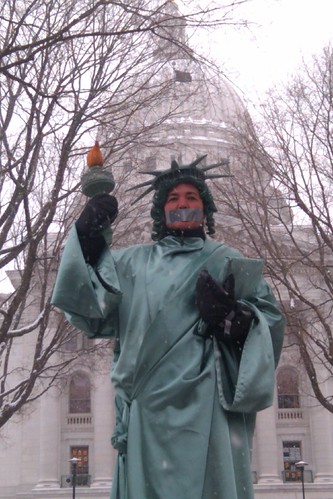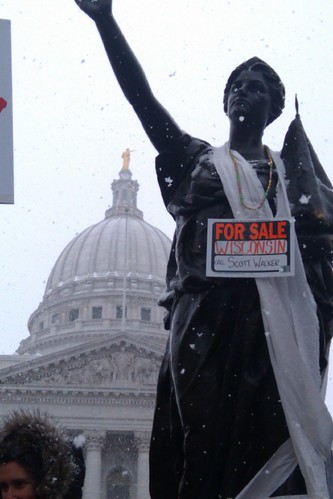I last wrote about books in September, but with thanks to the Milwaukee Public Library's online request capabilities, I can accurately reconstruct for you an auto-bibliography of my last four months. I read:

--Thirteen volumes of the collected
Fables comic book, covering about 98 issues of Bill Willingham's stories of fairy- and folk-tale characters living in exile in New York City. What starts out as a kind of pastiche of noir detective stories develops over several volumes into compelling and rich stories about connections to family, place, and belonging. It also, in places, draws a clear analogy to the modern state of Israel, as the Fables are besieged by the malevolent forces that keep them from their homelands. Unless you feel that sort of thing is too much for colored drawings about blind mice and frog princes, in which case: "Hey Kids! Comics!"
--Six volumes of the
Fables spin-off,
Jack of Fables, which concerns Jack (of the candlestick and the beanstalk and the frost nipping at your nose, here all the same Jack). More satirical and meta-fictional than Fables, and has some excellent daydreaming-Snoopy-like single page strips featuring a miniature Babe the Blue Ox, but sort of drops off in quality late in the run.
--Eleven volumes of Robert Kirkman's
The Walking Dead, a zombie comic that has lately become an AMC television series, which I read in one giant burst (70 or so collected issues) in order to stay current with my friend Jason's
Walking Dead podcast.
The Walking Dead is essentially a storyboard to a zombie movie that does not end, and the stark and sketchy black-and-white artwork give a look exactly tuned to George Romero's 1968
Night of the Living Dead. (For an excellent, delightfully academic, and wonderfully over-long examination of the zombie genre as a gloss on racism and xenophobia, go
here.)

--
Our Hero, Superman on Earth, Tom DeHaven. Hey Kids! Actual pictureless text! About comics! DeHaven, an author of novels about the funny pages and a novel about a 1930's WPA-era version of Superman, sets out an assignment to determine why (or if) Superman matters. As a history -- an account of the development of Superman, the poor treatment of the character's creators Jerry Siegel and Joe Schuster, the expansions and reboots of the mythos -- its quite a well-done book. The larger purpose, though, seems to get a bit lost in the history. Superman, it seems to me, is particular to the mid- to late-twentieth century. The man who can do anything, the schlub with the secret and powerful inner life, the alien who becomes the ultimate American -- these are stories and motifs that are pretty well tied to 1938, 1957, 1964, 1978, 1986. I don't know that they carry into a landscape of reality television, event disasters, and shock doctrines. (On the other hand, Superman as a concept is worth to much to shelve -- I read earlier this week that a new Superman has been cast for a 2012 movie.) What do you do with an icon whose day has passed? The Statue of Liberty surely knows, but she's not telling.

--
Peter & Max: A Fables Novel, Bill Willingham. Yeah, so I got a bit obsessive with the Fables stuff. Peter & Max is a (non-graphic) novel that in, you know,
words, deals with a set of brothers who had not previously factored into the comics series. Peter Piper (of the pepper pickles) and his brother Max square off in both fairytale- and modern Hamlin. Bo Peep factors in, too, and it's a pretty decent adventure yarn.
-- The Victorian Internet: The Remarkable Story of the Telegraph and the 19th Century's On-Line Pioneers, Tom Standage. A light history of the telegraph, somewhat tangentially related to the internet as it stood in 1996, when this book first appeared. (Remember when "online" was two words? Remember when we capitalized The Internet?) I was hoping for a more steampunk-y, Difference Engine type of approach, but it's always fun to read about 1800's Morse Code-related gambling scams and wire fraud.
--
The Magician's Book: A Skeptic's Guide to Narnia, Laura Miller. In the late 90's, I read salon.com all the time, until they started trying to charge for content or forcing me to watch ads, etc. (Oh, those early days On-Line the Internet, when content was briefly king: Suck.com, Michael Kinsley's era at Slate. Remember how the early "issues" of Slate -- called, then, an "eZine" --were also available, printed and a week later, at Starbucks? I bet stuff like that happened all the time on the telegraph wires.) Anyway, this is Laura Miller's atheistic/agnostic reader response to C.S. Lewis' Narnia books, and I read and enjoyed the first half without ever having read Lewis. (Possibly I read the Lion/Witch/Wardrobe, and I certainly saw the movie.) Second half is a walking tour of Ireland crossed with a history of Lewis' complicated friendship with Tolkien, and my attention wavered. But I still love you, Laura Miller, and I seek out your byline in the NYT Book Review.
--
Nobody's Perfect, Anthony Lane. A collection of New Yorker movie reviews and celebrity profiles from the 1990's. Lane is such a good and funny writer that it is well worth picking this up to see what he made, at the time, of Armageddon and Pearl Harbor. There's nothing better than reading Lane try to make sense of a big dumb action film. I know while I was reading this I was keeping a list of excellent one-liner take-downs to either post on this blog or e-mail to Sullivan. I wish I remembered where I put it.
--
Wicked River: The Mississippi When It Last Ran Wild, Lee Sandin. I have a hard time passing up books on the Old Man of the early American centuries. It's a thing I have, about a girl. I met her accidentally in St. Paul, MN, and it tore me up every time I heard her drawl her Southern drawl. Then I heard my dream was back downstream, cavorting in Davenport, and I followed you, Big River, when you called. But, yeah: more graft, drifters, drunks, and rabble rousers.

--
Richard Stark's Parker Vol. 1: The Hunter, Darwyn Cooke. A graphic novel (more comics!) adaptation of the late Donald Westlake's first crime novel written under the name of Richard Stark. Cooke, who created an outstanding reinterpretation of "Silver Age"era DC Comics in the graphic novel
The New Frontier, has a flair for illustrating this piece of violent noir from the early 60's setting. Something about his angular lines and two-color offset shading brings to mind the Playboy cartoons of that era, or Airstream aluminum campers, or Jackie Kennedy's pillbox hat.
--
NurtureShock, Po Bronson and Ashley Merryman. Everything you thought you knew about parenting? Wrong! Bronson and Merryman review recent studies to determine that telling your kids that they are smart makes them risk-averse, ignoring issues of race leads kids to draw negative conclusions about other races, siblings aren't fighting to get their parents' attention but to establish their own relationship, etc. Interesting reading for any parent, mostly to disabuse you of the notion that what works for sensible, logical adults doesn't work for child rearing.
 --A Visit From the Goon Squad
--A Visit From the Goon Squad, Jennifer Egan. This is the first book I read on the Kindle I received for Christmas, if that counts for anything. I use the Kindle mainly at night, when my wife and kids are asleep and the world is quiet.
Goon Squad (two words I was once within moments of tattooing on my right arm, before changing my mind/chickening out, and thanks for that, winds of fate!) is a novel created from inter-connected short stories, much like S. Amsterdam's
Things We Didn't See Coming or D. Johnson's
Jesus' Son. I can appreciate, in this era of the slow death of print, why the novel-by-linked-stories is a popular form -- it's more economically feasible in that stories can be sold first as stories and then as a novel. And when done well, as it is in
Good Squad or
Jesus' Son, the disconnection between stories (the parts that are absent between "chapters") becomes a kind of additive force, so that its possible to feel more deeply the lives of characters. You respond, as in life, to what
isn't there as much as what is. These particular stories cover a small group of tangentially-related characters, ranging in time from the west coast punk scene of the late 70's/early 80's and into a not-too-distant, post-war future of a second baby-boom (and the child-focused culture change that comes with it.) Some stories are Alice Munro-like stitches back and forth in time, another is David Foster Wallacian in its footnotes and linguo-psychological exactitude. The NYTimes Book Review listed Goon Squad as one of the ten best books of 2010, and I'm on board with the choice.
--
Zombie Spaceship Wasteland, Patton Oswalt. Oswalt's ruminations about growing up the eighties were strong and evocative, as is his suggestion that nerds typify into the three categories of his title, and that these categories inform how they respond to the world around them. There are set pieces, similar to those you find in other books by stand-up comedians, that aren't as successful. I could have gone on reading his more memoir-ish pieces for another two or three hundred pages, though.
 Estimates of yesterday's crowd have ranged from 70,000 to 120,000, but everyone I spoke to who'd been to the protest on previous days said it was by far the largest crowd yet. (AP Photo.)
Estimates of yesterday's crowd have ranged from 70,000 to 120,000, but everyone I spoke to who'd been to the protest on previous days said it was by far the largest crowd yet. (AP Photo.)



















